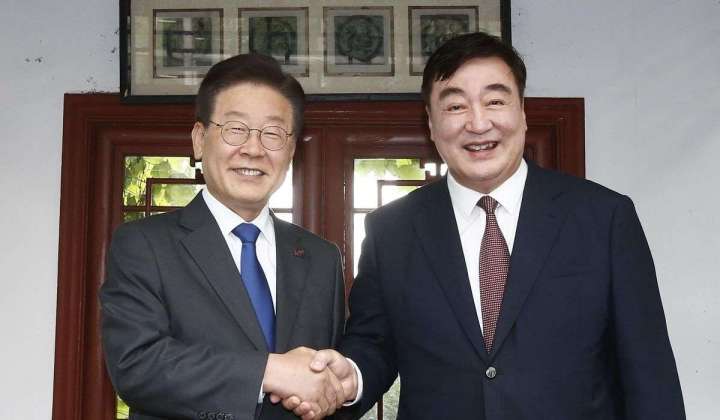Seoul raps Chinese’ wolf warrior’ over the paws

Seoul has given China’s ambassador to South Korea a dressing down, following remarks he made during a meeting with the leader of the opposition.
The envoy’s comments are just the latest in a string of undiplomatic remarks made by Beijing’s envoys that have raised eyebrows in Canberra, Manila and Tokyo. Their brazen style of communication has earned Chinese diplomats the brand “wolf warriors.”
Chinese Ambassador Xing Haiming was summoned by South Korean Deputy Foreign Minister Chang Ho-jin on Friday, following the Chinese diplomat’s dinner meeting with Lee Jae-myung, who heads the leftist Democratic Party of Korea, on Thursday.
According to Yonhap news agency, Mr. Chang “sternly warned” the ambassador for his “unreasonable and provocative” remarks, saying they could be construed as interference in domestic politics.
During his meeting with Mr. Lee, Mr. Xing had suggested that Korea and China should join hands to confront Japan, which is planning to release coolant water from its stricken Fukushima Nuclear Plant into the Pacific.
While Japan and the International Atomic Energy Agency say the water, which is being treated before being released, is safe, there are major concerns around the issue, particularly in neighboring South Korea.
Mr. Lee and his party are outspoken on the Fukushima issue and are fiercely critical of right-wing President Yoon Suk-yeol’s flagship foreign policy, which is improving relations with Japan.
The policy has won Mr. Yoon strong kudos from the United States, which seeks to upgrade trilateral defense cooperation in Northeast Asia against China and North Korea.
Mr. Xing also warned Korea not to lean too heavily toward the United States.
“China-Korea relations have been facing external challenges,” he told Mr. Lee. “While the U.S. is increasing pressure on China, some bet the U.S. wins and China loses. But this is a wrong judgment.”
During Mr. Yoon’s summit with Joe Biden in Washington in April, Seoul was granted a voice in U.S. nuclear weapon deployments and potential usage, in return for a commitment not to develop its own atomic deterrent.
The agreement was reached in a year in which the two capitals are celebrating the 70th year of their alliance, which was sealed following the close of the Korean War in 1953, when both countries fought against Chinese forces.
Enter the ‘Wolf Warriors’
Amid tense relations with the U.S., Chinese diplomacy under the rule of President Xi Jinping has become noted for its shrillness.
“Chinese officials have more openly expressed controversial thoughts, often with negative ramifications for bilateral relations with other countries,” noted a 2021 essay by the National Bureau of Asia Research on what it called a “shift” in Chinese diplomatic behaviors. “During the Covid-19 pandemic, this behavior has become known as ‘wolf warrior diplomacy.’”
The term “wolf warriors” was borrowed from a Rambo-esqe, and nationalistic Chinese action-movie franchise. Earlier this year, reports in media ranging from Germany’s Deutche Welle to America’s National Public Radio, noting personnel reshuffles in China’s foreign ministry, questioned whether Beijing might be pivoting away from verbally aggressive diplomacy.
However, today’s development in Seoul is just the latest in a string of brouhahas sparked around the region by Chinese diplomats in recent months.
In April, China’s ambassador to the Philippines, Huang Xilian, caused an uproar. Discussing Manila’s plan to grant U.S. troops more basing sites in the country, Huang made remarks that were seen to be a threat to the 150,000 Philippine workers in Taiwan.
“How dare he threaten us,” stormed Senator Risa Hontiveros, who characterized his statements as “disgraceful.” “He has no business being a diplomat if he is unable to engage with us in a respectful and dignified manner.”
Beijing’s ambassador to Canberra has also sparked controversy. In January, Xiao Qian informed surprised Australians that Japan had “invaded” Australia, and warned them that “history might repeat itself.”
In May, he held a press conference in which he criticized the AUKUS defense partnership between Australia, the U.K. and the U.S., saying the body is “not a good idea itself – and the nuclear submarine is an even worse one.”
Naturally, the most powerful U.S. ally in the region has also been targeted – by none other than China’s leading diplomat.
“Should some people from the Japanese side choose the beggar-thy-neighbor approach rather than a friendly partnership and take part in a new Cold War to contain China, bilateral relations will only suffer new wounds when the old ones are yet to be healed,” Chinese Foreign Minister Qin Gang, formerly his country’s ambassador to the United States, told a press conference in Beijing on May 7.
The “old wounds” were a reference to Japanese atrocities committed during the Pacific War.






